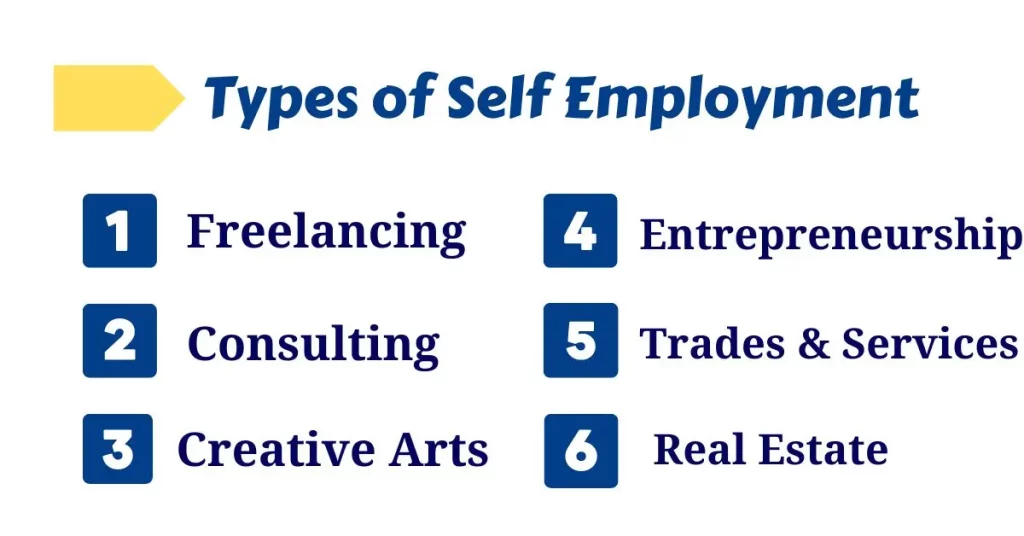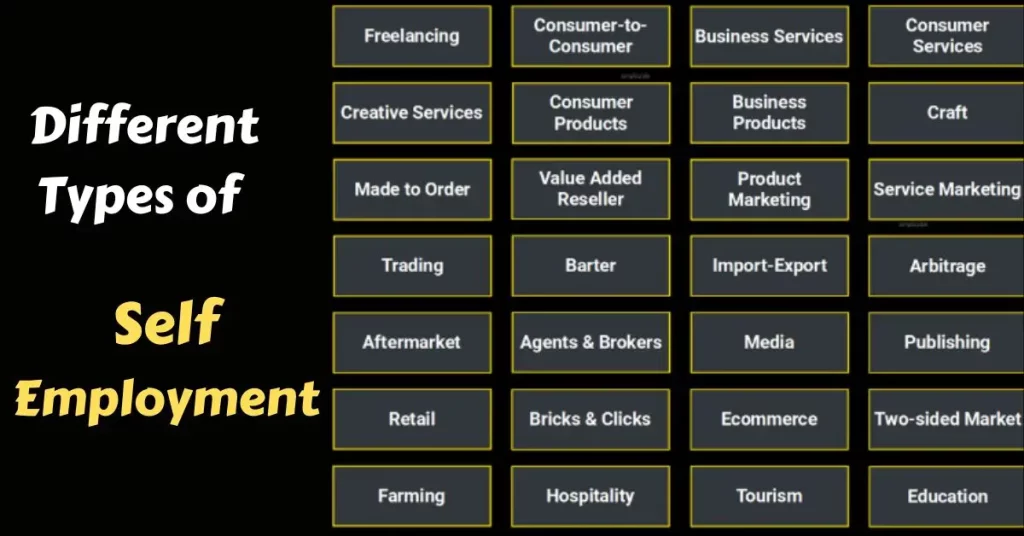Introduction:
Self Employment has evolved as a significant and feasible career route for individuals seeking autonomy, flexibility, and entrepreneurship in a fast-changing economic world. This comprehensive book looks into the world of self-employment, analyzing its definition, many varieties, benefits, drawbacks, and how to get started. This page tries to provide a complete overview of self-employment, whether you’re a prospective entrepreneur or wondering about alternative career possibilities.
Self Employment Definition:
Self-employment is a professional arrangement in which an individual runs their own business or provides services directly to clients rather than working for a company or organization. Individuals in this capacity are their own bosses, in charge of managing all elements of their firm, from operations and finances to marketing and customer relations. Individuals who work for themselves frequently supply specialized talents, products, or services in a variety of industries, such as consulting, freelancing, entrepreneurship, and the creative arts.
Understanding Self-Employment:
Self-employment personifies freedom and liberty. It enables people to turn their talents and hobbies into profitable businesses while maintaining control over their work environment, schedule, and decision-making processes. Self-employment, unlike traditional employment, does not involve a hierarchical structure or set working hours, providing a unique blend of flexibility and responsibility.
Types of Self-Employment:
We are discussing 7 types of self Employment.

Freelancing:
On a project basis, freelancers provide their knowledge in numerous industries, such as writing, graphic design, programming, and advising, to clients. They value the freedom to choose projects and clients while managing their workload. You can start Freelancing with zero experience.
Entrepreneurship:
Entrepreneurs start and run enterprises, often with novel products or services. They negotiate the hurdles of market competitiveness, funding, and expansion in order to build successful businesses.
Consulting:
Consultants provide businesses and individuals with specialized knowledge and guidance, utilizing their skills to meet specific challenges and opportunities.
Creative Arts:
Artists, musicians, writers, and performers use their skills to make money, either by selling their work directly or by performing at events and concerts.
Trades and Services:
Skilled specialists, such as plumbers, electricians, and mechanics, work independently to meet clients’ maintenance and repair needs.
Online Business:
The digital era has created opportunities for internet enterprises such as e-commerce stores, digital marketing agencies, and content developers to reach a global audience.
Real Estate:
Self-employed real estate agents and property managers assist clients in the purchase, sale, or management of real estate, earning commissions and fees for their services.
Other than these, There are Multiple types of Self Independent.

Self-Employment Advantages:
Flexibility:
Self-employed people have the flexibility to choose their own work hours and location, allowing for a better work-life balance.
Control:
They maintain control over corporate decisions, allowing them to respond quickly to market changes and opportunities.
Unlimited Earning Potential:
Self-employed people’s earnings are frequently uncapped since they directly profit from the success of their firm.
Diverse Opportunities:
Individuals can pursue their passions and talents through self-employment in a variety of businesses.
Tax Benefits:
Self-employed people are eligible for specific tax breaks and write-offs for business-related expenses.
Disadvantages of Self-Employment :
Income Variability:
Self-employment, unlike traditional employment, requires individuals to organize their own health insurance, retirement plans, and other benefits.
Uncertain Benefits:
Unlike traditional employees, self-employed individuals must arrange their own health insurance, retirement plans, and other benefits.
Workload:
Self-employment frequently means working long hours and juggling many tasks, which can lead to burnout.
Business Responsibilities:
Individuals are responsible for all business operations, including administrative tasks, marketing, and client acquisition.
Financial Risks:
Starting and running a business requires financial investments as well as potential hazards that can result in debt or losses.
How to Become Self-Employed
Identify Your Strengths:
Determine your abilities, interests, and expertise to determine the ideal sort of self-employment for you.
Business Plan:
Make a detailed business plan that outlines your objectives, target market, competitors, pricing, and marketing methods.
Legal Formalities:
Register your company, receive all relevant licenses or permissions, and follow all local restrictions.
Financial Planning:
Create a separate business bank account, monitor your funds, and consider obtaining startup funding if necessary.
Build a Brand:
Create a strong brand identity, which includes a business name, a logo, and an online presence via a website and social media.
Client Acquisition:
To ensure a consistent flow of projects or consumers, network, promote your services, and aggressively seek clients.
Continuous Learning:
Keep up with industry developments, improve your abilities, and react to changing market demands.
Who Is Considered Self-Employed?
Various criteria determine self-employment status, including:
Control: Possessing control over work decisions and processes
Financial Risk: Investing in business operations and maybe losing money.
Client Relationship: Rather than working with someone else, I serve clients directly.
Tools and Equipment: Providing your firm with tools, equipment, or a workspace
Conclusion:
Self-employment provides an exciting opportunity for individuals to achieve their professional goals while maintaining freedom and control. While it has its challenges, the benefits in terms of autonomy, prospective revenue, and the ability to turn interests into careers make it an appealing option. As the modern workforce evolves, self-employment remains an attractive option for people wishing to define their own professional path.
FAQs:
Is self-employment suitable for everyone?
Self-employment is ideal for people who are self-motivated, adaptable, and eager to take on the duties of running a firm.
How do taxes work for self-employed individuals?
Individuals who work for themselves often pay both income tax and self-employment tax, which includes Social Security and Medicare contributions.
Can self-employed individuals hire employees?
Yes, self-employed people can grow their firms and recruit workers, transitioning from a sole proprietorship to a small business.
What is the biggest advantage of self-employment?
The flexibility to control your work environment, schedule, and company decisions is a big advantage of self-employment.
Is there government support or programs for self-employed individuals?
Many governments provide assistance, subsidies, and resources to entrepreneurs and self-employed people in order to foster business growth and innovation.

